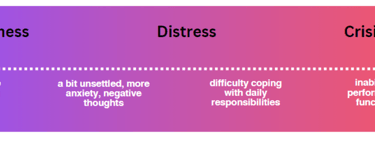The difference between worry and an anxiety disorder
We all get anxious and the Bible has a lot to say about it.
Jesus tells us, “do not worry” (Matt.6:25). Peter encourages Christians to “Cast all your anxiety on him because he cares for you” (1 Pe. 5:7). And everyone knows Paul’s words to the Philippian church: “Do not be anxious about anything, but in every situation, by prayer and petition, with thanksgiving, present your requests to God” (Phil. 4:6).
God's Word says so much about anxiety because it's a common, normal response to the unknown. The people of Jesus' day had real fears about everyday things (food and clothing). The Church experienced real persecution, which meant loss of property and life. And even Paul wrung his hands over the Church's spiritual condition.
Wait--are you saying that Paul worried?
Yes, the same person who told one church "do not be anxious" admitted being anxious about another church. Paul wrote, "I am afraid (φοβέω) that...your minds may somehow be lead astray" (2 Cor.11:3). And then a few verses later said, "Besides everything else, I face daily the pressure of my concern (μέριμνα) for all the churches" (2 Cor. 11:28).
He used two Greek words: "afraid" (phobeō) and "concern" (merimna) to describe his fear and anxiety over the church's spiritual condition.
Jesus used the same word when he taught us not to worry "about your life" (Matt. 6:25, 27,28,31,34). And again, when He told His disciples they would be brought before authorities, saying, "do not worry about how to defend yourselves" (Lk. 12:11). Peter used the word when he wrote, "cast all our anxiety (μέριμνα) on Him" (1 Pe.5:7). And Paul even praised Timothy for his "genuine concern" (merimna) for the Philippian church.
Worry, concern, anxious--The English translators use these common modern terms to render the Greek word merimna, which means "drawn in two directions, divided, or pulled apart." The way it's used in the New Testament tells us that not all worry is the of the same category. The level of anxiety while being dragged before authorities is different than what we should expect from a faithful leader who is genuinely concerned for the church. Yet, both instances use the same word to describe these different occasions.
The same is true today.
We use the terms "anxious" and "worry" to explain our emotions in various states. Think of a spectrum. On one end is nervousness and concern, but it’s manageable. On the other extreme is outright fear and a panic attack. As anxiety increases, it becomes more difficult to manage and interferes with our ability to perform daily tasks.


As we move along the spectrum, manageable worry and anxiety becomes unmanageable. For example, everyone worries about life, stress, health, finances, children, and so on. That's what Jesus and Paul were talking about. Manageable anxiety is not a sign of mental illness. Anxiety becomes a serious mental illness when it becomes debilitating; when fear prevents you from performing regular, daily activities.
From a clinical perspective, the person who continues in this overwhelmed state for more than six months might be diagnosed with anxiety disorder. There are many types of anxiety disorders. One of the most common is called generalized anxiety disorder. Here are the criteria:
Excessive anxiety and worry occurring most days of the week for at least six months that is accompanied by at least three of the following symptoms:
Restlessness or feeling keyed up or on edge
Being easily fatigued
Difficulty concentrating or mind going blank
Irritability
Muscle tension
Sleep problems (difficulty falling asleep, staying asleep, or restless sleep)

